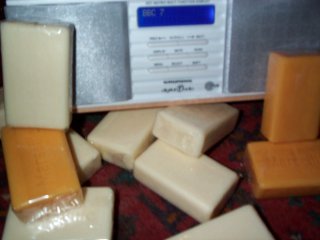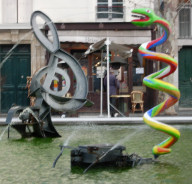Have confidence in your listener - POSTPRODUCTION
| Let the listeners do the work. |
| Give the listeners situations and sound pictures to work on- get them to use their imaginations. |
| Students need to learn the conventions of postproduction for radio drama. These are specifically different from TV and film. You can overdo the layers of sound. |
| Read STUDENT EMILY below. The main problem was that she had not listened to enough radio plays, and had not yet taken on the conventions of radio drama - layering sound. That is understandable. She then took on the challenges further, and came up with very good work. |
| You even hear things that your ears did not. See 'listening' at http://www.savoyhill.co.uk/technique/listening.html |

HERE IS WHAT STUDENT EMILY ADVISES:
The first scenes that Alan (teacher) listened to (when I had started work
on postproduction) caused problems. They were all over-produced with too
many layers of sound, and too filmic.
"Let the words do their magic", he would say, "you're directing for radio, not television! Your scenes are too layered".
It took a lot of convincing. But I went back to basics, and listened again to other scenes from previous productions of Alan Beck. I also listened to some key radio play scenes from the BBC that Alan had selected, and to the BBC radio soap, The Archers.
I began to realise how true these comments were. I had gone too far in my postproduction work.
However, I still found it hard to trust the listener so much.
The main problem was that I am less aware of radio conventions than television conventions. And so I felt a need to constantly back up the text with action and sound effects.
The result was that my first post-produced scenes were literally halved by Alan.
The sound picture was too big, too busy, too confusing.
And I would say "but Alan, they need to be doing something, going somewhere?" and he would reply "no, they don't. Trust your listener."
Even towards the end of the project, I don't think that I had completely become comfortable with such a miniaturist form (or so it seemed to me). I still listen to radio soap scenes of mine (such as 4.2.5 and 5.4.2) and think "but that's not enough! It's flat! It needs more. The characters aren't doing enough".

To WELCOME PAGE
Radio Soap (serial drama) - HOW TO MAKE IT
Five-minute episodes - or short episodes
Step by step instruction from Alan Beck.
Learn about radio drama on this site along with my book - Beck, Alan, Radio Acting, London: A & C Black (1997) ISBN 0-7136-4631-4
This is how to make a short-form soap - entertaining (above all) and you can include issues (issues that could influence the listeners' behaviour).
Further: production, scripting, web site, marketing, focus group meetings, drop-in script, copyright material logging, trails, soap launch.

LINKS WITH OTHER SITE
Radio Drama - directing, acting, technical, learning & teaching, researching, styles, genres
This is a complete curriculum of scripts, techniques, advice, sound files - effects and atmoses (with no copyright and so free to use), detailed script commentaries, etc. -
Contact: [email protected]
This site's address: http://www.savoyhill.co.uk/soap/index.html